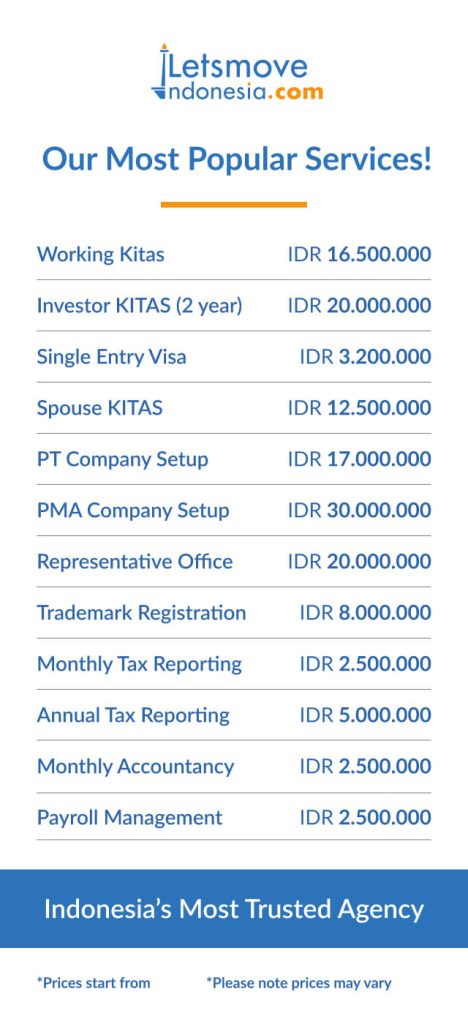Investment is a crucial factor in driving economic growth for companies, projects, and even nations. According to the Indonesian Dictionary (KBBI), investment is the allocation of capital in an entity to generate profit.
To bolster the national economy, the Indonesian government recently revised laws related to business, investment, taxation, labour, and more. These revisions aim to create a more conducive business climate, fostering economic growth and improving people’s welfare.
Especially concerning foreign investment, there are limitations on certain business sectors. Some businesses are prohibited from investors, as outlined in Indonesia’s Negative Investment List (DNI).
For investors looking to invest in Indonesia, it’s essential to comply with all applicable regulations, including the provisions within the DNI.
In this article, we will break down the meaning of DNI, its legal basis, the types of investments included in the DNI, and its impact on establishing PT and PT PMA companies in Indonesia.
What is DNI?
The Negative Investment List, or Daftar Negatif Investasi, is a list of business sectors compiled by the government to inform potential investors about businesses that are not allowed in Indonesia, along with their regulations, particularly concerning maximum share ownership.
Legal Basis of Indonesia Negative Investment List
The legal basis for the Negative Investment List in Indonesia is founded on several key regulations:
-
Law Number 11 of 2020 on Job Creation (UU Cipta Kerja), governs various aspects related to ease of doing business, including investment.
-
Presidential Regulation Number 10 of 2021 on Business Fields for Investment, provides further guidance on the types of businesses open for investment and those regulated by the DNI.
-
Presidential Regulation Number 49 of 2021, amending Presidential Regulation Number 10 of 2021, accommodating the latest changes in investment activities in Indonesia.
These regulations are essential legal foundations for determining investment limitations, including the formation and implementation of the DNI, which serves as a reference for investors in conducting business activities in Indonesia.
Business Sectors Included in the DNI
The Negative Investment List (DNI) is a list that regulates the types of businesses that can or cannot be funded by investors, both local and foreign. Here’s an explanation:
Open Business Fields
These fields are wide open for anyone who wants to invest. There are no special requirements, so all investors are welcome to invest here. Examples include the tourism sector (like hotels and resorts), the creative economy (like restaurants, cafes, and sports venues), and many more.
Closed Business Fields
These fields can only be managed by the government due to their relation to public interest or national security. Examples include the defence industry (like weapons production), alcoholic beverage production, illicit drug production, and casinos. Private investors are not allowed to be involved in these fields.
Open Business Fields with Requirements
Investors can enter these fields, but there are certain conditions to be met. These conditions can include:
- Foreign capital ownership limits: Foreign investors can only own a portion of the company’s shares.
- Specific locations: Businesses can only be established in predetermined locations.
- Special permits: Investors must obtain special permits from the government to operate these businesses.
- 100% domestic capital: Businesses can only be funded by local investors.
- Partnership with MSMEs: Large investors must collaborate with Micro, Small, and Medium Enterprises (MSMEs) in running these businesses.
Examples of business fields with requirements include some types of manufacturing, agriculture, and fisheries.
Functions of The Negative Investment List in Indonesia
The list of Negative investments in Indonesia serves to protect the Indonesian economy and provide more business opportunities for investors.
Over time, the DNI can change according to government regulations. Investment has a complex impact, so it’s not only expected to increase national economic growth but also to absorb labour.
This will lead to a decrease in unemployment.
Therefore, it’s important for investors to understand the DNI in Indonesia in depth for further planning regarding investment in the country.
Latest Negative List Update in 2024
It’s crucial to know about the latest Indonesian DNI, particularly which business sectors are open with requirements and which are completely closed. The government released the latest DNI based on Presidential Regulation 10/2021 and Presidential Regulation 49/2021.
The DNI covers the following business sectors:
- Traditional medicine industry for humans
- Raw materials industry for traditional medicine for humans
- Various wood-based building materials and furniture products
- Coffee processing industry
- The traditional shipbuilding industry, such as pinisi, candik, etc.
- Woodcraft industry
- Rendang production
- Traditional cosmetics and beauty product manufacturing
- Batik fabric manufacturing
- Traditional crispy food manufacturing, like crackers or chips
- Art studios
- Hajj and Umrah service industry
- Illicit drug (narcotics) industry
- Companies engaged in online or offline gambling (casinos)
- Capture of protected fish species listed in Appendix I of the Convention on International Trade in Endangered Species (CITES)
- Extraction and utilization of coral for building materials
- Chemical weapons industry
- Chemical industry that can damage the ozone layer
Advantages of DNI
Presidential Regulation 49/2021 on Business Fields for Investment has the main vision of encouraging increased investment from both domestic and foreign sources.
It also aims to accelerate development while increasing protection for Micro, Small, and Medium Enterprises and Cooperatives (MSMEs) and various strategic national sectors.
With the DNI, foreign investors are not allowed to invest in business sectors dominated by MSMEs.
For investment activities, businesses are required to operate in larger sectors that can absorb more labor.
In general, the background for issuing the Negative Investment List Policy is considering Indonesia’s active participation in expanding the ASEAN Economic Community market, necessitating increased investment from various aspects to spur stable, high, sustainable, and inclusive economic growth.
Additionally, the DNI is one of the standard provisions that serve as guidelines for implementing statutory regulations.
Given the importance of this policy, it’s no wonder that its development is highly anticipated by business actors.
Disadvantages of DNI
Foreign investors can only invest in two categories: open business fields and open business fields with requirements.
This will undoubtedly limit foreign investment and could result in the failure to absorb a large amount of labor.
Indonesia needs foreign investment to increase labour absorption in large numbers to stabilize the Rupiah exchange rate.
Foreign investment does have both positive and negative impacts on economic growth in Indonesia.
Therefore, foreign investment must be managed well to provide welfare for the Indonesian people while maintaining environmental sustainability.
This concludes the discussion on the Negative Investment List in Indonesia.
Start Your Foreign Investment in Indonesia Now
Understanding the Negative Investment List (DNI) is crucial for anyone looking to invest in Indonesia. While the Indonesian government welcomes foreign direct investment (FDI) to stimulate economic growth, certain sectors are restricted or closed off entirely to protect local businesses and strategic national interests. Navigating these regulations can be complex, but with the right guidance, you can successfully establish your business in this dynamic market.
Indonesia offers a wide range of business lines open to foreign investment, spanning various sectors such as tourism, manufacturing, agriculture, and services. These sectors present lucrative opportunities for investors seeking to tap into Indonesia’s growing economy and consumer base. By understanding the DNI and focusing on permissible sectors, you can unlock the potential for significant returns on your investment.
Partner with Lets Move Indonesia for Seamless Business Establishment
For comprehensive assistance in the establishment of your business in Indonesia, Lets Move Indonesia is the ideal partner. Our experienced consultants are well-versed in the intricacies of the DNI and other relevant regulations. We will guide you through the company registration process, ensuring compliance with all legal requirements. Our expertise extends to obtaining necessary licenses and permits, connecting you with reliable local partners, and helping you find prime properties to create a distinguished business hub in Indonesia.
Don’t let the complexities of the DNI deter you from investing in Indonesia. With Lets Move Indonesia by your side, you can confidently navigate the regulatory landscape and establish a successful business in this vibrant market. Our team is committed to providing personalized support, tailored solutions, and expert advice to help you achieve your investment goals.
Contact Lets Move Indonesia today to embark on your journey towards establishing a thriving business in Indonesia. Let us be your trusted partner in unlocking the full potential of your foreign direct investment in this exciting and dynamic economy.
Found this article interesting? Check out our other useful articles about business updates here!
Navigating BPOM Regulations for Market Entry in Indonesia: A Comprehensive Guide











